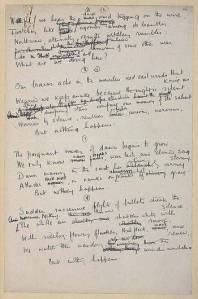Background
One of my goals for the last couple of years has been to make my English classes more student-centred, and I’ve found that poetry lends itself nicely to this goal. Individual poems take less time to teach than a play or a novel, so if my attempts at student-centred learning go awry, they will affect only one or two lessons.
A few weeks ago, I was thinking about an Edcamp-style session I will be organizing for other English teachers this winter, and I had a realization: if an Edcamp is an educator-centred form of professional development, why couldn’t the same approach work for a student-centred classroom? I decided to try it out with my grade 11 English class.
I had the following goals:
- They needed to continue learning how to conduct rigorous, in-depth analysis of poetry.
- They needed to continue learning how to synthesize texts.
- They needed to take ownership of their learning.
The second and third goals were actually the easy ones. It was the first goal that gave me some challenges because it’s often easy to think about different ways of teaching and leave the rigour in the dust.
The Assignment
- The assignment was not graded because it was the first time I’d done something like this, and the first time they had, the feedback was formative. The students made their own 5 point rubric for this assignment. As a class, they came up with the overall categories that would be needed to have a respectful, rigorous, engaging Edcamp. Then, in groups, they took one category and filled out the criteria for it. Finally, as a class, they reviewed and modified the criteria, and agreed upon the final rubric. When the Edcamp was over, the students marked themselves according to the rubric, and I gave them feedback as well.

The War Poetry Archives has some original copies of English war poetry, such as this one of “Exposure”.
- The students took home copies of Wilfred Owen’s “Exposure” and Siegfried Sassoon’s “Wirers”. They had a few days to read the poems and were encouraged to do so more than once in a very carefully in a quiet place. Then, they had to come up with one insightful question or topic they would be interested in discussing.
- One day before the Edcamp class, the students sent me their questions and topics, and I collated them into larger categories. In class the next day, I posted the categories, and the students signed up for the one(s) they were interested in. The class then was allowed to proceed like an Edcamp with one moderator per group. The students were allowed to change groups at any time, and the discussions were allowed to be flexible. I went back-and-forth among the groups and joined in the discussions but never felt the need to lead them.
The Outcome
My worries about the lack of rigour subsided fairly quickly after the discussions got going. The students all discussed everything I would have led them to discuss and more. The discussions were interesting, and even I came away with some insights that I hadn’t had about those poems before.
As well as filling out their self-reflections, I asked each student to add a couple of sentences about what whether or not she felt she achieved the intended outcomes, what worked well about the assignment, and how the assignment could be improved.
What I received was easily the most positive feedback I’ve ever gotten about an assignment. Every student indicated they really liked the Edcamp approach, that they learned a lot, and that they liked that the learning came from them. A couple of students mentioned that a small number of students didn’t participate in the discussion as much as others did, so they provided useful suggestions about how to engage those students too.
My Reflection
Initially, I was nervous about this assignment, but after seeing how well it went, I will definitely be doing something like this again. However, I will need to think about how to engage those who weren’t as active in the discussion. I would also like to make the topics a bit more diverse. I ended up with only two topics, which made the groupings rather large. The students didn’t tend to move from their own group, either. On the other hand, they did enjoy the conversations and learned quite a bit about the poems, so perhaps I shouldn’t be imposing my view of what an Edcamp should be on students who did quite well with what it looked like in our class.
Eventually I’d like to expand the student-centredness of the assignment. Last year, I gave my grade 10s an assignment that allowed them to choose poems from a long list, present them to each other online, and vote on which ones they’d like to include in their Socratic seminars. Somehow I want to figure out how to have the students choose their poems and choose what to discuss about the poems. Once I get that sorted out, then I can start thinking about how to apply the approach to novels and plays. For now, though, I think this is a good beginning.

Pingback: What Happened When I Gave My Students Choice? | Doors Marked Pull